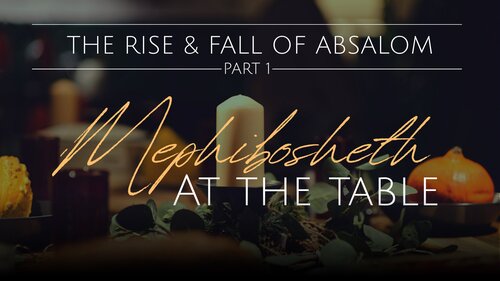Mephibosheth at the Table: A Seat for the Broken
Mephibosheth at the Table: A Seat for the Broken
Aaron Rios | Garden City Church | July 6th, 2025

As we step into a new series exploring the rise and fall of Absalom, one of King David’s sons, we begin not with conflict or betrayal—but with mercy. This week, we turn our eyes to a lesser-known character with a powerful story.
His Name Was Mephibosheth
Found in 2 Samuel 9, Mephibosheth was the son of Jonathan and grandson of King Saul. When tragedy struck—his father and grandfather killed in battle—he was just five years old. In the chaos, his nurse fled with him, only to drop him, leaving him crippled in both feet (2 Samuel 4:4). A child of royalty, suddenly marked by pain, loss, and disability—not because of anything he did, but because of the times he was born into.
Sound familiar?
Many of us come into this world carrying wounds that weren’t our fault—born into brokenness, trauma, even spiritual exile. Like Mephibosheth, we find ourselves living in Lo Debar—a place whose name literally means “no pasture,” “no word,” or “nowhere.”
The Kindness of a King
But here’s where the story flips. In 2 Samuel 9, David—now established as king—asks, “Is there anyone still left of the house of Saul to whom I can show kindness for Jonathan’s sake?” (2 Samuel 9:1, NIV).
David could have ignored Saul’s bloodline. He could have seen Mephibosheth as a threat. Instead, he shows him kindness—not because Mephibosheth earned it, but because of a covenant with Jonathan.
David sends for him. And when Mephibosheth arrives, limping and lowly, David says something unexpected: “Don’t be afraid… you will always eat at my table” (2 Samuel 9:7, NIV). That’s grace.
From Lo Debar to the King’s Table
This is a gospel moment. David’s invitation prefigures the heart of Jesus, who says, “Let the little children come to me,” who touches lepers, who heals the lame, who breaks bread with outcasts. God doesn’t just restore Mephibosheth’s land; He restores his identity. He is called not “the cripple,” but “the son of Jonathan.” His lineage matters. His place is restored.
So many of us settle for Lo Debar—living in spiritual no-man’s-land, thinking we’re forgotten or disqualified. But our King is calling. Not just to visit His palace—but to sit at His table, daily, as one of His children.
Mercy for the Wounded
This story reminds us:
We are Mephibosheth—wounded, yes, but welcomed. The King hasn’t forgotten us. There is still a seat at the table.
Final Takeaway
Fear may have dropped you. Life may have left its mark. But grace will always lift you back up. In God’s Kingdom, even the lame dine like royalty.
Pull up your seat. The table is set.
His Name Was Mephibosheth
Found in 2 Samuel 9, Mephibosheth was the son of Jonathan and grandson of King Saul. When tragedy struck—his father and grandfather killed in battle—he was just five years old. In the chaos, his nurse fled with him, only to drop him, leaving him crippled in both feet (2 Samuel 4:4). A child of royalty, suddenly marked by pain, loss, and disability—not because of anything he did, but because of the times he was born into.
Sound familiar?
Many of us come into this world carrying wounds that weren’t our fault—born into brokenness, trauma, even spiritual exile. Like Mephibosheth, we find ourselves living in Lo Debar—a place whose name literally means “no pasture,” “no word,” or “nowhere.”
The Kindness of a King
But here’s where the story flips. In 2 Samuel 9, David—now established as king—asks, “Is there anyone still left of the house of Saul to whom I can show kindness for Jonathan’s sake?” (2 Samuel 9:1, NIV).
David could have ignored Saul’s bloodline. He could have seen Mephibosheth as a threat. Instead, he shows him kindness—not because Mephibosheth earned it, but because of a covenant with Jonathan.
David sends for him. And when Mephibosheth arrives, limping and lowly, David says something unexpected: “Don’t be afraid… you will always eat at my table” (2 Samuel 9:7, NIV). That’s grace.
From Lo Debar to the King’s Table
This is a gospel moment. David’s invitation prefigures the heart of Jesus, who says, “Let the little children come to me,” who touches lepers, who heals the lame, who breaks bread with outcasts. God doesn’t just restore Mephibosheth’s land; He restores his identity. He is called not “the cripple,” but “the son of Jonathan.” His lineage matters. His place is restored.
So many of us settle for Lo Debar—living in spiritual no-man’s-land, thinking we’re forgotten or disqualified. But our King is calling. Not just to visit His palace—but to sit at His table, daily, as one of His children.
Mercy for the Wounded
This story reminds us:
- God sees the broken and invites them in.
- Mercy isn’t earned—it’s extended.
- Our past, our pain, our place of exile does not cancel our invitation.
We are Mephibosheth—wounded, yes, but welcomed. The King hasn’t forgotten us. There is still a seat at the table.
Final Takeaway
Fear may have dropped you. Life may have left its mark. But grace will always lift you back up. In God’s Kingdom, even the lame dine like royalty.
Pull up your seat. The table is set.
Recent
Archive
2025
March
April
July
August
September

No Comments